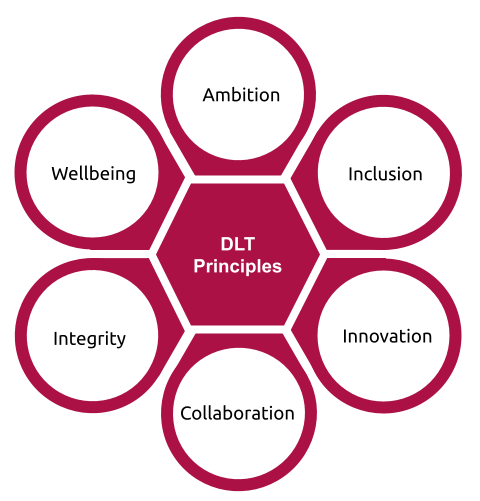Introduction
The Digital Learning Team (DLT) provides support, advice and professional development for academic teaching and learning practice through the use of digital technologies across all of the academic college/schools/institutes (and, occasionally, some professional services) at Hallam through:
- Contributing to the shaping of the University’s strategic priorities around digital learning, including the implementation of key projects that support them.
- Acting as a key liaison role between teaching practice and Digital Technology Services.
- Providing consultation to academic colleagues to enhance learning and teaching practices.
- Supporting the use and application of different learning technologies such as Blackboard, interactive tools, resource sharing and collaboration, e-Portfolio tools, video conferencing, screen casting and lecture capture.
- Offering staff development opportunities aligned to college/schools/institutes priorities.
- Creating resources that support key learning, teaching and student experience priorities for the University.
Digital Learning Team Principles
The Digital Learning Team (DLT) adheres to a set of principles. These principles are taken from the Hallam Values with an additional value focussing on wellbeing.

Ambition
Our philosophy is that every member can make an impact and our role is to encourage and inspire each individual to be the best they can be.
For members of the team this means:
- Promote and nurture collegiality, collaboration and participation in peer-review and peer-support amongst our team.
- A commitment to your own professional development and learning.
- Recognising and sharing your knowledge and experience (e.g. AFHEA/SFHEA, joining external committees and groups, membership of Hallam working parties).
For staff and students that we support, this means:
- We provide a range of support and development opportunities for them, and see support as a pathway to promote further development of their own practice.
- We build digital confidence by empowering staff to learn how to do tasks themselves, rather than doing tasks for them.
- Encourage confidence/positivity around digital technologies and pedagogies.
- Promote independent learning through the guidance materials we find and develop.
- Be an integral part of the Hallam academic and learning community.
Inclusion
We speak up for equality and diversity so that every single person can feel they belong in our community.
For members of the team this means:
For staff and students that we support, this means:
- Promoting staff adoption of accessible and inclusive practices in digital teaching and learning.
- Ensuring all guidance materials we create and staff development activities we deliver are easy to locate, accessible and inclusive.
- Acknowledge, respect and adapt to the diversity of teaching staff’s past experience and capability.
Innovation
We encourage curiosity, enquiring minds and creative solutions; all of which can bring positive change in real-world settings.
For members of the team this means:
- Utilising dedicated time for exploration and CPD activities aligned to our roles.
- Exploring innovative use of both new and existing technologies to support teaching, learning and assessment.
- Supporting the implementation of new technologies.
- Sharing innovative practice from external sources such as external university visits, external conferences and events.
For staff and students that we support, this means:
- Identifying and promoting new initiatives and effective practice, both from within the University and the wider sector.
- Facilitating the development and sharing of innovative practice across the University.
- Taking a pedagogy-first approach.
Collaboration
We nurture a supportive culture where working together is a part of everyday learning and problem-solving.
For members of the team this means:
- Collaboration is our default state of working.
- Working primarily as part of the overall DLT rather than as sub-teams. Helping and supporting each other in all activities that we do.
- Taking an active role in developing and delivering team staff development activities and events.
- Welcoming and supporting the induction of new DLT team members.
For staff and students that we support, this means:
- Actively co-developing and co-delivering staff development events with teaching staff.
- Promoting collaborative teaching and learning approaches and practices.
- Create and locate key resources with and for the academic community.
- Constantly seeking to expand our opportunities for collaboration.
Integrity
We cultivate an environment of openness, authenticity and compassion where everyone can thrive.
For members of the team this means:
- Following legal guidelines around issues like accessibility, equality, copyright and GDPR.
- Following the University’s code of behaviour.
- Taking responsibility for your work and following tasks through to resolution.
- Raising concerns appropriately around behaviour you’ve witnessed or experienced (within and outside of the team).
For staff and students that we support, this means:
- Encouraging staff to follow guidelines for accessibility, copyright, GDPR, etc. through direct advice or signposting.
- Helping support the development of academic integrity with staff and students.
Wellbeing
We commit to providing a healthy working environment and improving the quality of working lives.
For members of the team this means:
- The university encourages colleagues to engage in wellbeing activities and these are supported and endorsed by leaders and managers, and recognises that wellbeing varies by each individual.
- Leaders and managers will be vigilant to team members’ health and wellbeing.
- Leaders and managers will encourage team members to protect colleagues from illness by taking appropriate actions, e.g. encouraging the reporting of ill health and staying away from the workplace if likely to be infectious.
Undertaking training and development opportunities that supports individual’s wellbeing, and develops respect for the wellbeing of colleagues.
For staff and students that we support, this means:
- Raising awareness of wellbeing issues related to digital learning practices for staff and students.
Last updated: 08/04/2025 NB